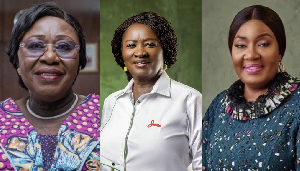 Akosua Frema, Prof Naana Jane, and Naa Torshie
Akosua Frema, Prof Naana Jane, and Naa Torshie
The New Patriotic Party (NPP) faces a crucial decision regarding its leadership structure, with the potential selection of a female running mate for the 2024 presidential elections representing a progressive step towards gender equality and inclusive governance.
Choosing a woman for this role would place Ghana among the many nations that have embraced female leaders at the highest levels of government.
With the December elections approaching, the political parties are under scrutiny for their leadership choices, particularly in terms of gender representation.
Selecting a female running mate would, therefore, be a significant move for the NPP and demonstrate a commitment to inclusivity and equality.
Women make up 51% of the electorate, making their voices essential in shaping the political landscape hence political parties must prioritize gender representation to reflect the electorate's composition and concerns accurately.
If the NPP opts for a female running mate, it would not only enhance their appeal among female voters but also set a progressive example for the nation. This decision could mark a pivotal moment in Ghana's political history, showcasing a dedication to advancing women's roles in governance.
Notable examples of countries with female presidents include Dominica (Sylvanie Burton), Barbados (Sandra Mason), Georgia (Salome Zourabichvili), Greece (Katerina Sakellaropoulou), and Honduras (Xiomara Castro).
This list extends to countries like India (Droupadi Murmu), Taiwan (Tsai Ing-wen), and Trinidad and Tobago (Christine Kangaloo), among others.
Africa has also seen a wave of female leadership, with Joyce Banda in Malawi, Ellen Johnson Sirleaf in Liberia, Ameenah Gurib-Fakim in Mauritius, Sahle-Work Zewde in Ethiopia, and Elisabeth Domitien in the Central African Republic.
Female vice-presidents and prime ministers have served in nations such as The Gambia, Tanzania, Zambia, Liberia, Burundi, Rwanda, Senegal, São Tomé and Príncipe, Togo, Uganda, Mozambique, Mali, Namibia, and DR Congo.
The global trend towards female leadership underscores the potential for Ghana to embrace gender diversity at the highest echelons of power.
Advocates for a female running mate argue that increasing women's representation in political leadership is crucial for Africa's socioeconomic development.
The opposition National Democratic Congress (NDC) took the challenge with the flagbearer John Mahama selecting Prof Jane Naana Opoku-Agyemang as his running mate and setting the tone for other parties.
With the NPP flagbearer yet to select his running mate, the calls have been calling in thick and fast for him to follow the NDC path and pick a woman candidate and the calls were loudest during the commemoration of the Mothers’ Day.
President of the Methodist Church of Ghana, Dr. Paul Kwabena Boafo, called on the ruling party to follow the NDC in selecting a female running mate for the upcoming polls.
During a sermon at the Most Rev Kwesi Dickson Memorial Methodist Church in Adjiringanor, which coincided with Mother’s Day, Dr. Boafo commended the NDC for their progressive step and stressed the importance of women in leadership roles.
"I know it is a good thing as it shows how important our mothers and our women are," Dr. Boafo stated, adding, "I pray that the others will also learn and copy from this to show yes indeed in celebrating women it is not just for celebrating but that we will bring them to the front burner and make them part and parcel of our political landscape."
At the Living Streams International, the founder Reverend Ebenezer Markwei minced no words when expressed strong support for increased female representation in Ghanaian politics, specifically calling on political parties to select women as running mates for the December 7 presidential election.
Rev. Markwei stressed the importance of having more women in significant government roles.
"I wish we have more women in government. We need more women parliamentarians. Maybe we need more women vice presidents," he stated.
The Loyal Ladies, a vibrant group within the New Patriotic Party (NPP) also added its voice advocating for a female vice-presidential candidate in the 2024 elections.
According to the group, the glass ceiling persists despite the many achievement of women in the NPP and stressed there remains untapped potential awaiting recognition and elevation.
“We believe that the nomination of a woman as a vice-presidential candidate will not only break significant barriers but will also underline our party’s commitment to gender equality and inclusive leadership," the group said.
Advocates highlight that women in leadership roles can offer new perspectives and solutions, essential for combating poverty and disease.
Despite significant strides in various professional fields, including education, sports, business, politics, fashion, and music, Ghana's political arena still presents challenges for women.
However, the examples set by other African nations show that gender diversity in leadership is achievable and beneficial.
The call for a female running mate in Ghana is not merely about symbolism.
It is rooted in a broader agenda of women's empowerment and equitable representation.
As the NPP considers its options, the potential selection of a female running mate could signal a transformative step towards inclusive governance, reflecting the changing dynamics and aspirations of Ghanaian society.
In the lead-up to the December elections, the decisions made by political parties, particularly the NPP, regarding their leadership structures will be closely watched.
These choices have the potential to reshape Ghana's political landscape, setting a precedent for future elections and the country's governance model.